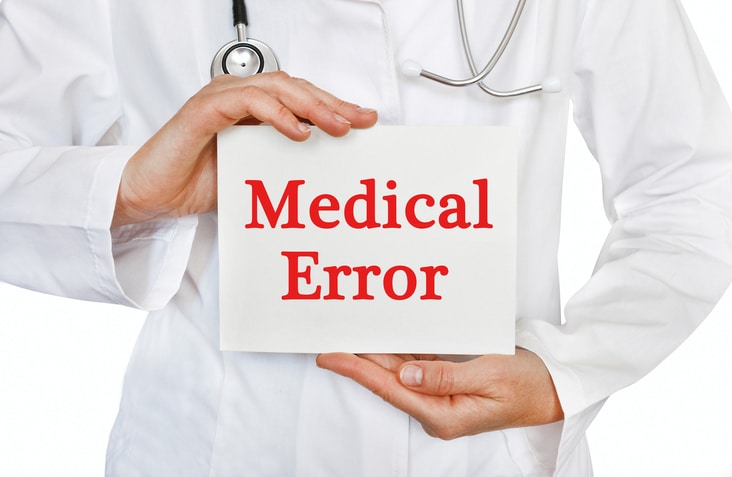When you go to the doctor because you’re not feeling well, there’s one piece of information you want to know above all others…
You want to know what’s wrong.
Is that asking too much?
Apparently it is. A new Mayo Clinic study exposes how appallingly bad America’s health care system is at providing accurate diagnoses.
Only 12% of patients who came to the famed hospital in Rochester, Minn., for a second opinion were given a completely accurate diagnosis by their primary care doctor, the study showed.
About 20% of patients with serious conditions—like cancer—were told they had a completely different illness. These are the kinds of cases where the right diagnosis can mean the difference between life and death. But doctors are routinely getting them wrong.1
Dr. Mark Graber is a professor emeritus of medicine at the State University of New York at Stony Brook. He is founder of the Society to Improve Diagnosis in Medicine. Dr. Graber has studied patient diagnostic issues for decades and is familiar with the Mayo Clinic study.
“Doctors are humans, and they make the same cognitive mistakes we all make,” Dr. Graber said.2
“Diagnosis is extremely hard. There are 10,000 diseases and only 200 to 300 symptoms.”
While the numbers in the Mayo study seem shocking, they are nothing new.
In 2015, the National Academy of Medicine reported that most people will receive an incorrect or late diagnosis at least once in their lives. It estimated that every year 12 million Americans are misdiagnosed.
Researchers have found that diagnostic errors contribute to 10% of patient deaths. That means diagnostic mistakes kill more people than Alzheimer’s disease, diabetes, suicide, and car accidents combined.3 4
Why Medical Errors Happen
When you analyze the numbers, they show that diagnostic errors happen for many reasons.
There isn’t enough collaboration and communication among doctors, patients, and patients’ families. Doctors don’t like to embarrass a colleague by pointing out the wrong diagnosis. So the colleague might repeat the diagnostic error with other patients. The health care culture discourages transparency and disclosure of errors.5
Adding to the problem is health information technology. More doctors’ offices and health care systems now have electronic health records. While intended to be helpful in tracking patients’ medical status, doctors often find them hard to use.
Help Yourself Get an Accurate Diagnosis
There are strategies that can help your doctor make the right diagnosis:
- Before going to the doctor, write down all of your symptoms. Be as specific as you can. When did they begin? When do they flare up or recede? What are the nature of the symptoms? Be detailed in your description.
- Write down previous treatments for the condition. Did they help?
- Keep a list of all the medications you are on, and any previous hospital admissions.
- Share these notes with your doctor during your exam. Don’t tell your doctor verbally. Hand your doctor the paper with your notes. This leaves less room for misunderstanding.
If your doctor diagnoses you with a specific condition, ask if your symptoms could be caused by something else.
This seems like a simple question—one that you shouldn’t have to ask. But family doctors are often pressed for time. Asking them to consider other possibilities can make them think about your case a bit longer…and lead to a more accurate diagnosis.
And here’s the most important advice… If you have any doubt about your diagnosis, or if you are told you have a serious condition or one that requires surgery, you should always get a second opinion.
Like this Article? Forward this article here or Share on Facebook.
References:
1 https://www.washingtonpost.com/national/health-science/20-percent-of-patients-with-serious-conditions-are-first-misdiagnosed-study-says/2017/04/03/e386982a-189f-11e7-9887-1a5314b56a08_story.html?utm_term=.a9efbee67b80
2 https://www.washingtonpost.com/national/health-science/20-percent-of-patients-with-serious-conditions-are-first-misdiagnosed-study-says/2017/04/03/e386982a-189f-11e7-9887-1a5314b56a08_story.html?utm_term=.8bdb89def9e9
3 https://www.cdc.gov/nchs/fastats/deaths.htm
4 https://www.washingtonpost.com/news/to-your-health/wp/2015/09/22/most-americans-who-go-to-the-doctor-will-get-a-wrong-or-late-diagnosis-at-least-once-in-their-lives-study-says/?tid=a_inl&utm_term=.7c7b5f6709b4
5 https://www.washingtonpost.com/news/to-your-health/wp/2015/09/22/most-americans-who-go-to-the-doctor-will-get-a-wrong-or-late-diagnosis-at-least-once-in-their-lives-study-says/?utm_term=.f33c9c58ee87

